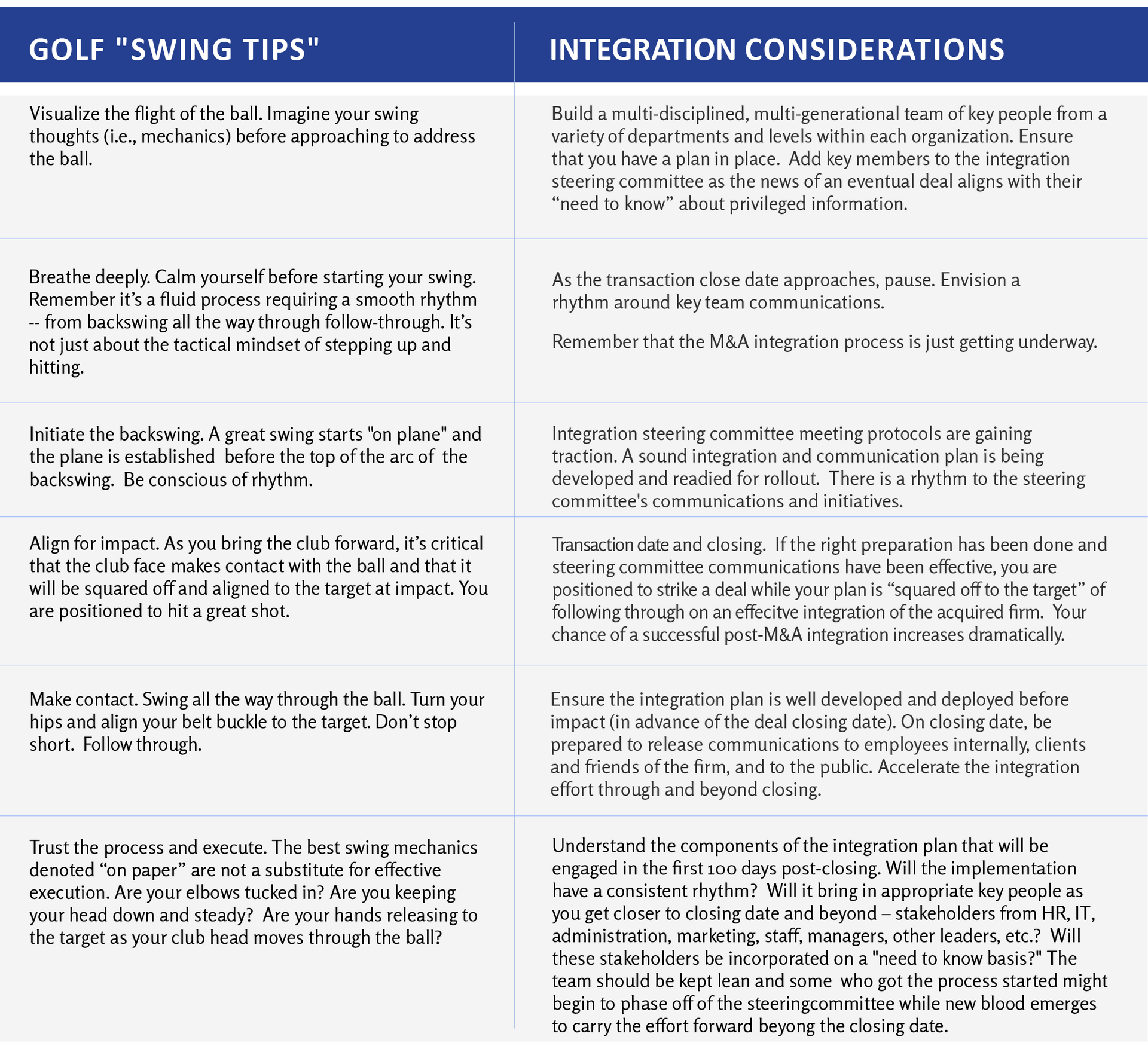GET STARTED TODAY: 877.442.4769
CPA Lessons From the Gridiron: Staying in Alignment When the Game is on the Line

With the college football playoffs set and the NFL season coming down the home stretch, there have been countless close games going down to the final seconds. The difference between winning and losing often has more to do with a team’s culture and preparation than it does with their pure talent. In the same way, most accounting firms have smart, conscientious, talented people at all levels of the organization. The difference between high performing firms and mediocre firms is that the high performers have the ability to stay in alignment and hold their composure when the pressure is on.
While it’s easy to put your organization’s core values on the wall of your lobby or locker room, you don’t find out who has really bought into those values until the you-know-what hits the fan. Like elite sports teams and military units, high-performing firms stay together and stick to the game plan when faced with a big client loss, departure of a key employee, or busy season fire drills. Under the same circumstances, lesser firms throw in the towel, point fingers, and watch staff head for the exits.
Sound familiar?
Sun Tsu, the legendary general and philosopher of ancient times said,
“Every battle is won before it’s ever fought.” In the heat of battle, I’ve found, you must think like a triage unit in combat. Casualties are all around you and coming in fast; you must treat the most serious life-threatening injuries before the ones that are merely painful – no matter how anguished the victim. In the heat of battle, you’re not going to get perfection. You must do the best you can with the people, resources and time you have to work with.
As a leadership coach, I’ve noticed that firms with a strong culture and governance model are particularly well equipped to handle “battlefield” conditions.
They tend to have four characteristics in common:
1. They stay in alignment when everything seems in chaos.
College football powerhouse, Florida State University, started the 2024 season ranked No. 10 in the Associated Press poll coming off last year’s 13-1 season in which finished ranked No.6 in the country. Despite a loaded roster filled with “blue chip” transfers, the Seminoles finished the 2024 season 2-10, having been walloped 31-11 by archrival Florida as we went to press. What caused such a dramatic reversal?
The TV pundits point to an anemic running game, poor tackling, deluge of injuries and too many penalties, etc. But I think it’s something deeper -- a dysfunctional culture. Florida State hasn’t faced adversity in many years and succumbed to the pressure of losing a few early season games when so many were expecting a national championship run. Like great firms, great sports teams don’t get hung up on perfection. They have the ability to shake off early season setbacks. Pretenders don’t.
As part of the weak culture, Florida State didn’t get the same caliber of recruits via the “transfer portal” (which allows today’s college athletes to switch schools at will, without having to sit out a year). The transfers were highly talented, but not necessarily team players. As the Tallahassee Democrat explained: “While the signings were designed to help achieve short-term success, many believe the strategy led to longer-term problems: A lack of program culture and diminished team loyalty. If that turns out to be the core issue, there may not be a quick fix in sight.”
Like great firms, great teams can quickly “onboard” and integrate lots of new faces into their organization, but lesser teams cannot. As The Democrat noted: “The disparity among new and returning players can cause a lack of chemistry, accountability and resentment in the locker room. That's a far cry from [the approach to] recruiting and team building 50 years ago.”
As legendary former Alabama head coach Nick Saban said on national television: “My greatest tool when trying to establish the culture was the bench. When guys don’t do what they’re supposed to do or buy into [the team’s vision] the way they’re supposed to, you put them on the bench,” he explained. As Saban and other pundits observed, Florida State’s coaching staff seemed reluctant to bench underperforming starters for fear of having them enter the transfer portal, and the downward spiral continued to feed on itself.
A similar situation has played out in professional football with my beloved Chicago Bears. After years of futility, the Bears finally seemed to have things turned around in 2024. With an electrifying young quarterback at the helm, they sprinted out to a 4-2 start until they faced their first real test of the season against a strong Washington Commanders team. Just two seconds away from going 5-2, the Bears had a three-point lead and Washington pinned beyond midfield with no way to stop the clock. Then disaster struck. The Commanders completed a 60-yard “Hail Mary” pass that bounced off multiple players as time expired and into the waiting arms of receiver, Noah Brown, in the end zone who seemed as shocked as anyone about his good fortune. A few weeks later against the playoff-bound Green Bay Packers, the Bears had a chance to kick the winning field goal in the final seconds, but they mismanaged the clock, resulting in a longer than necessary field goal attempt that was eventually blocked. Two weeks later on Thanksgiving Day, they had the NFL’s best team, the Detroit Lions on the ropes. But in front of a national TV audience, they let 33 seconds slip away with timeouts remaining before firing a play downfield with no time left to seal another embarrassing loss. The Bears losing streak is now at seven games and counting as we go to press.
After the Thanksgiving debacle, Bears head coach, Matt Eberflus, told the media: “I think we handled the situation the right way.” Bears management didn’t agree and fired Eberflus shortly thereafter.
Of course, Eberflus had been on the hot seat since the Washington Miracle Catch that started the downward spiral two months ago. Chicago defender Tyrique Stevenson was at the core of this epic breakdown of this play:
- He missed the snap early in the play because he was busy taunting Commanders’ fans in the stands.
2. He carelessly tipped the ball to Noah Brown for the game-winning touchdown instead of batting it down to the ground.
3. Worst of all, Stevenson didn’t accept responsibility for his actions. He removed himself from practice after hearing he would be benched for the following game – and then was reinstated by Coach Eberflus after missing just a few plays, implying to the rest of the team Stevenson had served a sufficient punishment. Those decisions further eroded team morale.
Imagine if Eberflus upheld the simplest of cultural values for his team: play till the whistle blows and own up to your mistakes. Eberflus might still be employed, and the Bears might have better than an outside shot at the playoffs.
2. They focus on the front windshield, not the rearview mirror.
As CPAs, we tend to be financial historians, more comfortable reviewing the past rather than leaning into the future. But did you ever wonder why the rearview mirror is so much smaller than the front windshield? That’s because automakers want you to focus on what’s ahead of you rather, not on what’s behind you? But so often, when business leaders – like professional sports team general managers -- are fighting fires all day, they’re trying to lead from behind. As a result, they have poor time management skills, they have a weak leveraging model, and the team is confused about the firm’s vision and strategic direction. Ultimately, there is no clarity around what management is hoping to accomplish. High performing firms, by contrast, have an established governance process and effective leveraging model. They use SMART goals (Specific, Measurable, Achievable, Relevant and Time-Bound), and they align their strategy with tactics.
3. They are strategic not just tactical.
As Sun Tzu said: “Tactics without strategy is the noise before defeat.” I couldn’t agree more. You must play forward scenarios so that you can anticipate a variety of future paths that may reveal themselves for you as a leader. This is an opportunity to emphasize the importance of a CEO and to provide that leader with the ability to be the head coach who drives the firm’s vision, makes big decisions, controls a significant portion of compensation, and focuses on the firm’s big picture goals and objectives. CPAs tend to be more linear in their thought processes. They see things oftentimes as black and white. The reality is that a strategic plan, while not intended to be a checklist, is the best prescription for success in any business, sports or wartime scenario.
4. Their leaders are accountable.
Like great sports teams, great accounting firms find a way to win, no matter how dire the circumstances or how little time is left on the clock. Roles and responsibilities are clearly defined at all levels of the organization. That way, when the pressure of a two-minute drill is on, everyone can simply act proactively in the situation; they don’t have to think about what they’re doing, where they’re going, or whom to ask for help. Most importantly, they have a culture of accountability. Top management, like great head coaches, accept responsibility for the greater organization’s mistakes and they address them head on rather than looking for ways to point fingers.
Conclusion
Like great football teams, great accounting firms stick together and hold their composure when the pressure is on. They focus on the future rather than dwelling on the past. They are strategic, not just tactical, and everyone from top leaders to “bench players” is accountable. How is your firm building a winning governance structure or getting itself back on track? I’d love to hear about it.



OUR VALUES:
Courage. Teamwork. Perseverance. Integrity. Commitment. Creativity.






